MKT 645: Summary of Market Research on Electronic Health Records
VerifiedAdded on 2023/04/20
|5
|1151
|445
Report
AI Summary
This report presents a summary of market research focused on Electronic Health Records (EHRs). The research investigates the benefits and challenges of EHR implementation in healthcare settings. The study outlines the significance of EHRs in improving healthcare practices, including early patient health condition detection and efficient data storage. However, it also acknowledges concerns regarding data security and cybercrime vulnerability. The research proposal encompasses a mixed-method approach, combining qualitative and quantitative data collection techniques. Data collection involves literature reviews and surveys distributed to healthcare professionals and hospital management. The report outlines data analysis methods using MS-Excel for data summarization and graphical representation, along with ethical considerations such as participant privacy and data security. The research aims to assess the effectiveness of EHR tools, identify potential barriers, and provide insights for improved EHR management and implementation.
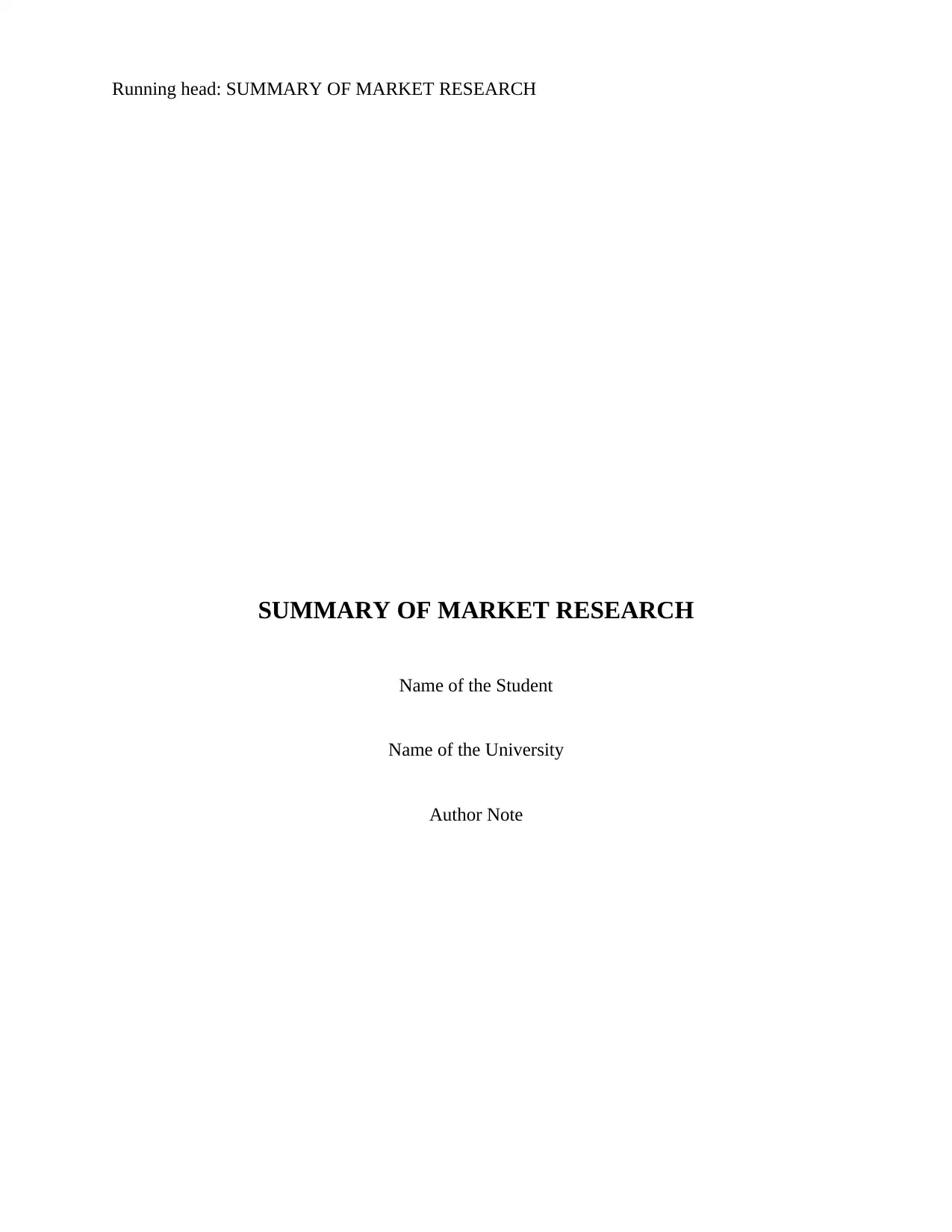
Running head: SUMMARY OF MARKET RESEARCH
SUMMARY OF MARKET RESEARCH
Name of the Student
Name of the University
Author Note
SUMMARY OF MARKET RESEARCH
Name of the Student
Name of the University
Author Note
Paraphrase This Document
Need a fresh take? Get an instant paraphrase of this document with our AI Paraphraser
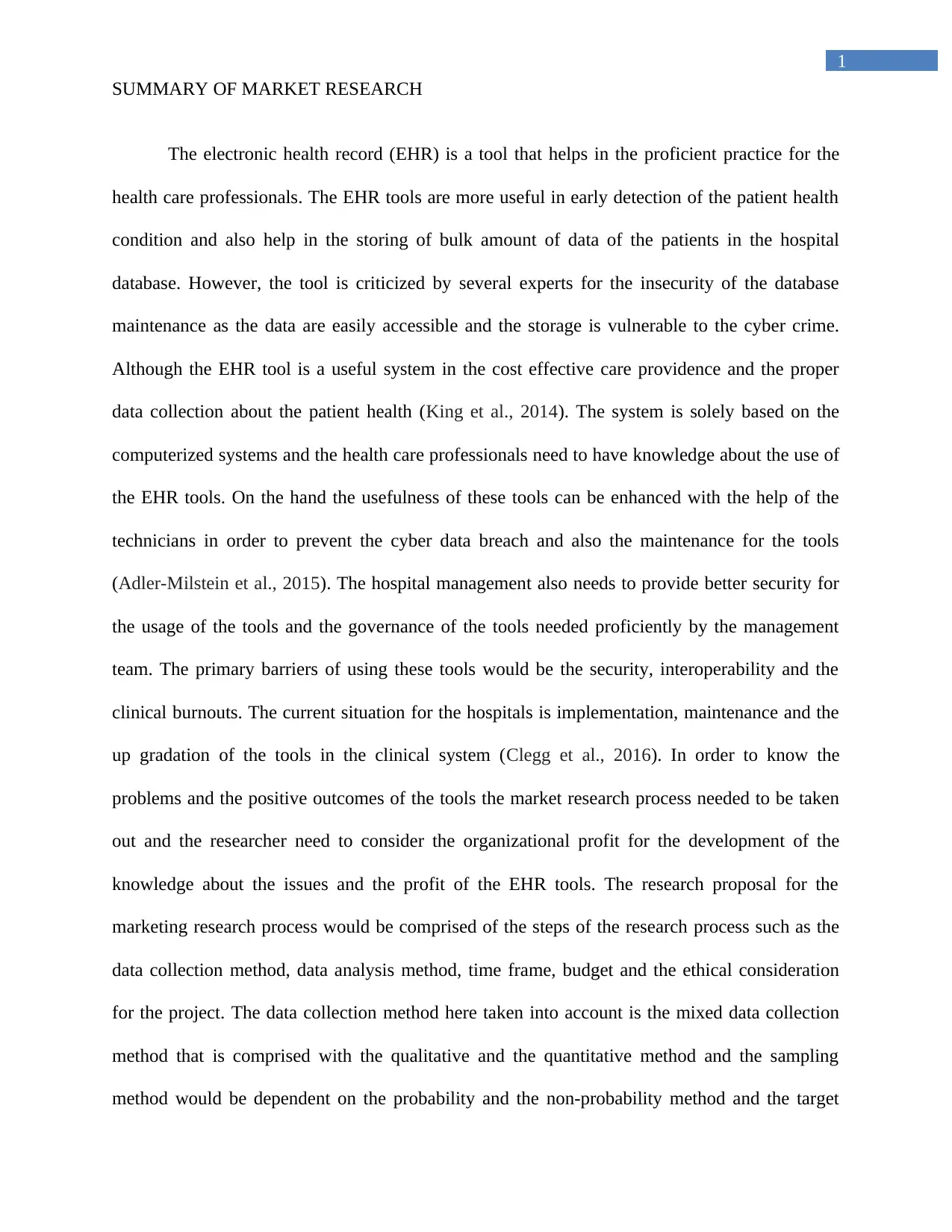
1
SUMMARY OF MARKET RESEARCH
The electronic health record (EHR) is a tool that helps in the proficient practice for the
health care professionals. The EHR tools are more useful in early detection of the patient health
condition and also help in the storing of bulk amount of data of the patients in the hospital
database. However, the tool is criticized by several experts for the insecurity of the database
maintenance as the data are easily accessible and the storage is vulnerable to the cyber crime.
Although the EHR tool is a useful system in the cost effective care providence and the proper
data collection about the patient health (King et al., 2014). The system is solely based on the
computerized systems and the health care professionals need to have knowledge about the use of
the EHR tools. On the hand the usefulness of these tools can be enhanced with the help of the
technicians in order to prevent the cyber data breach and also the maintenance for the tools
(Adler-Milstein et al., 2015). The hospital management also needs to provide better security for
the usage of the tools and the governance of the tools needed proficiently by the management
team. The primary barriers of using these tools would be the security, interoperability and the
clinical burnouts. The current situation for the hospitals is implementation, maintenance and the
up gradation of the tools in the clinical system (Clegg et al., 2016). In order to know the
problems and the positive outcomes of the tools the market research process needed to be taken
out and the researcher need to consider the organizational profit for the development of the
knowledge about the issues and the profit of the EHR tools. The research proposal for the
marketing research process would be comprised of the steps of the research process such as the
data collection method, data analysis method, time frame, budget and the ethical consideration
for the project. The data collection method here taken into account is the mixed data collection
method that is comprised with the qualitative and the quantitative method and the sampling
method would be dependent on the probability and the non-probability method and the target
SUMMARY OF MARKET RESEARCH
The electronic health record (EHR) is a tool that helps in the proficient practice for the
health care professionals. The EHR tools are more useful in early detection of the patient health
condition and also help in the storing of bulk amount of data of the patients in the hospital
database. However, the tool is criticized by several experts for the insecurity of the database
maintenance as the data are easily accessible and the storage is vulnerable to the cyber crime.
Although the EHR tool is a useful system in the cost effective care providence and the proper
data collection about the patient health (King et al., 2014). The system is solely based on the
computerized systems and the health care professionals need to have knowledge about the use of
the EHR tools. On the hand the usefulness of these tools can be enhanced with the help of the
technicians in order to prevent the cyber data breach and also the maintenance for the tools
(Adler-Milstein et al., 2015). The hospital management also needs to provide better security for
the usage of the tools and the governance of the tools needed proficiently by the management
team. The primary barriers of using these tools would be the security, interoperability and the
clinical burnouts. The current situation for the hospitals is implementation, maintenance and the
up gradation of the tools in the clinical system (Clegg et al., 2016). In order to know the
problems and the positive outcomes of the tools the market research process needed to be taken
out and the researcher need to consider the organizational profit for the development of the
knowledge about the issues and the profit of the EHR tools. The research proposal for the
marketing research process would be comprised of the steps of the research process such as the
data collection method, data analysis method, time frame, budget and the ethical consideration
for the project. The data collection method here taken into account is the mixed data collection
method that is comprised with the qualitative and the quantitative method and the sampling
method would be dependent on the probability and the non-probability method and the target
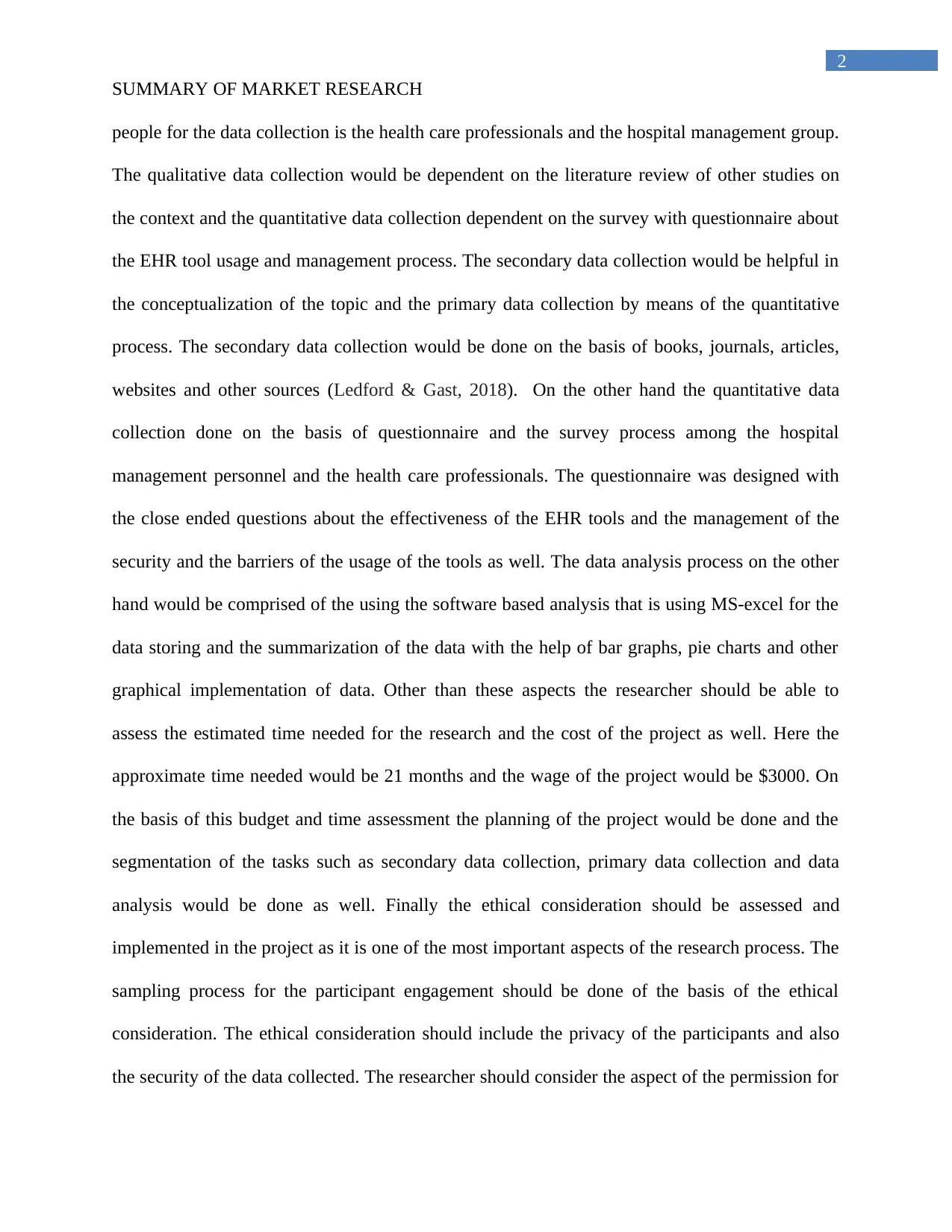
2
SUMMARY OF MARKET RESEARCH
people for the data collection is the health care professionals and the hospital management group.
The qualitative data collection would be dependent on the literature review of other studies on
the context and the quantitative data collection dependent on the survey with questionnaire about
the EHR tool usage and management process. The secondary data collection would be helpful in
the conceptualization of the topic and the primary data collection by means of the quantitative
process. The secondary data collection would be done on the basis of books, journals, articles,
websites and other sources (Ledford & Gast, 2018). On the other hand the quantitative data
collection done on the basis of questionnaire and the survey process among the hospital
management personnel and the health care professionals. The questionnaire was designed with
the close ended questions about the effectiveness of the EHR tools and the management of the
security and the barriers of the usage of the tools as well. The data analysis process on the other
hand would be comprised of the using the software based analysis that is using MS-excel for the
data storing and the summarization of the data with the help of bar graphs, pie charts and other
graphical implementation of data. Other than these aspects the researcher should be able to
assess the estimated time needed for the research and the cost of the project as well. Here the
approximate time needed would be 21 months and the wage of the project would be $3000. On
the basis of this budget and time assessment the planning of the project would be done and the
segmentation of the tasks such as secondary data collection, primary data collection and data
analysis would be done as well. Finally the ethical consideration should be assessed and
implemented in the project as it is one of the most important aspects of the research process. The
sampling process for the participant engagement should be done of the basis of the ethical
consideration. The ethical consideration should include the privacy of the participants and also
the security of the data collected. The researcher should consider the aspect of the permission for
SUMMARY OF MARKET RESEARCH
people for the data collection is the health care professionals and the hospital management group.
The qualitative data collection would be dependent on the literature review of other studies on
the context and the quantitative data collection dependent on the survey with questionnaire about
the EHR tool usage and management process. The secondary data collection would be helpful in
the conceptualization of the topic and the primary data collection by means of the quantitative
process. The secondary data collection would be done on the basis of books, journals, articles,
websites and other sources (Ledford & Gast, 2018). On the other hand the quantitative data
collection done on the basis of questionnaire and the survey process among the hospital
management personnel and the health care professionals. The questionnaire was designed with
the close ended questions about the effectiveness of the EHR tools and the management of the
security and the barriers of the usage of the tools as well. The data analysis process on the other
hand would be comprised of the using the software based analysis that is using MS-excel for the
data storing and the summarization of the data with the help of bar graphs, pie charts and other
graphical implementation of data. Other than these aspects the researcher should be able to
assess the estimated time needed for the research and the cost of the project as well. Here the
approximate time needed would be 21 months and the wage of the project would be $3000. On
the basis of this budget and time assessment the planning of the project would be done and the
segmentation of the tasks such as secondary data collection, primary data collection and data
analysis would be done as well. Finally the ethical consideration should be assessed and
implemented in the project as it is one of the most important aspects of the research process. The
sampling process for the participant engagement should be done of the basis of the ethical
consideration. The ethical consideration should include the privacy of the participants and also
the security of the data collected. The researcher should consider the aspect of the permission for
⊘ This is a preview!⊘
Do you want full access?
Subscribe today to unlock all pages.

Trusted by 1+ million students worldwide
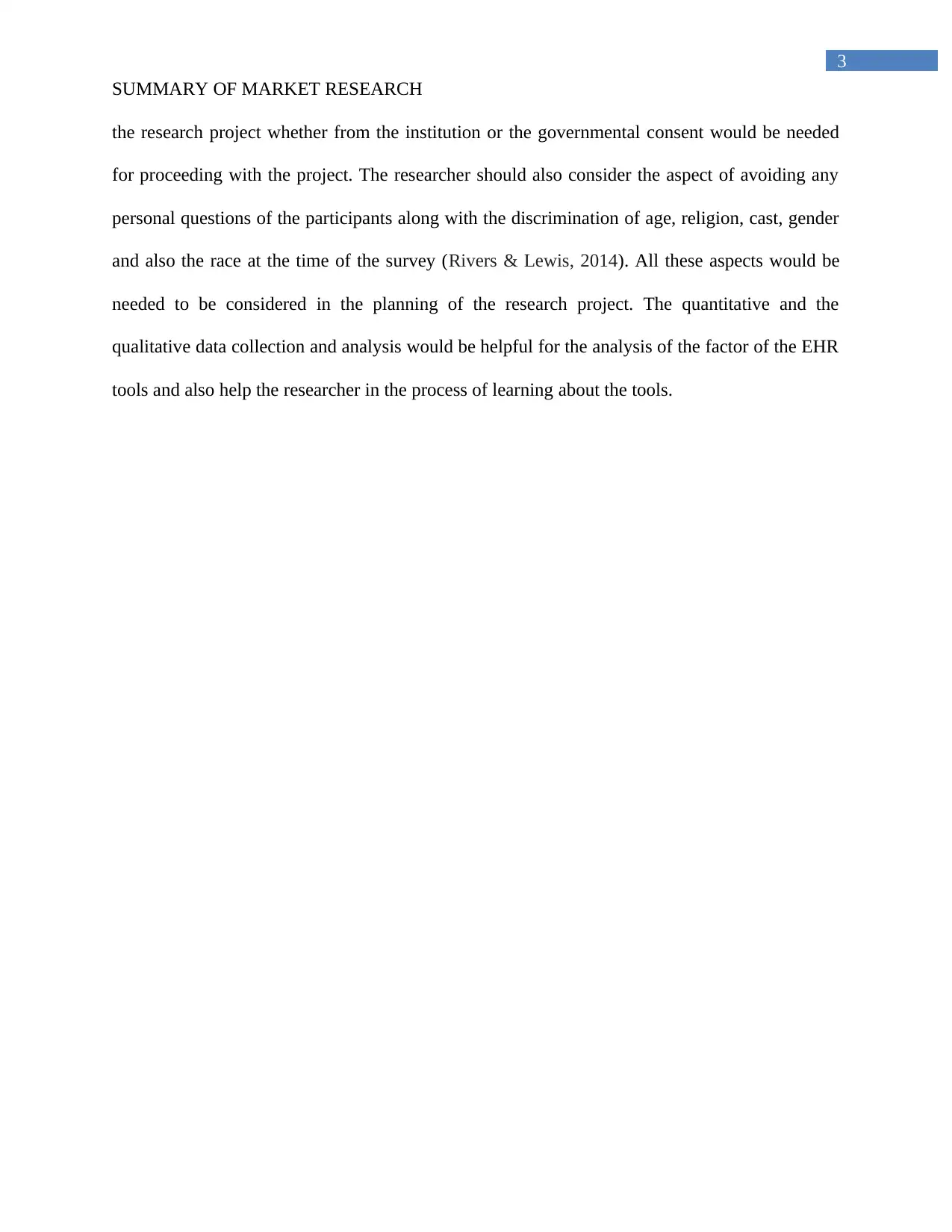
3
SUMMARY OF MARKET RESEARCH
the research project whether from the institution or the governmental consent would be needed
for proceeding with the project. The researcher should also consider the aspect of avoiding any
personal questions of the participants along with the discrimination of age, religion, cast, gender
and also the race at the time of the survey (Rivers & Lewis, 2014). All these aspects would be
needed to be considered in the planning of the research project. The quantitative and the
qualitative data collection and analysis would be helpful for the analysis of the factor of the EHR
tools and also help the researcher in the process of learning about the tools.
SUMMARY OF MARKET RESEARCH
the research project whether from the institution or the governmental consent would be needed
for proceeding with the project. The researcher should also consider the aspect of avoiding any
personal questions of the participants along with the discrimination of age, religion, cast, gender
and also the race at the time of the survey (Rivers & Lewis, 2014). All these aspects would be
needed to be considered in the planning of the research project. The quantitative and the
qualitative data collection and analysis would be helpful for the analysis of the factor of the EHR
tools and also help the researcher in the process of learning about the tools.
Paraphrase This Document
Need a fresh take? Get an instant paraphrase of this document with our AI Paraphraser
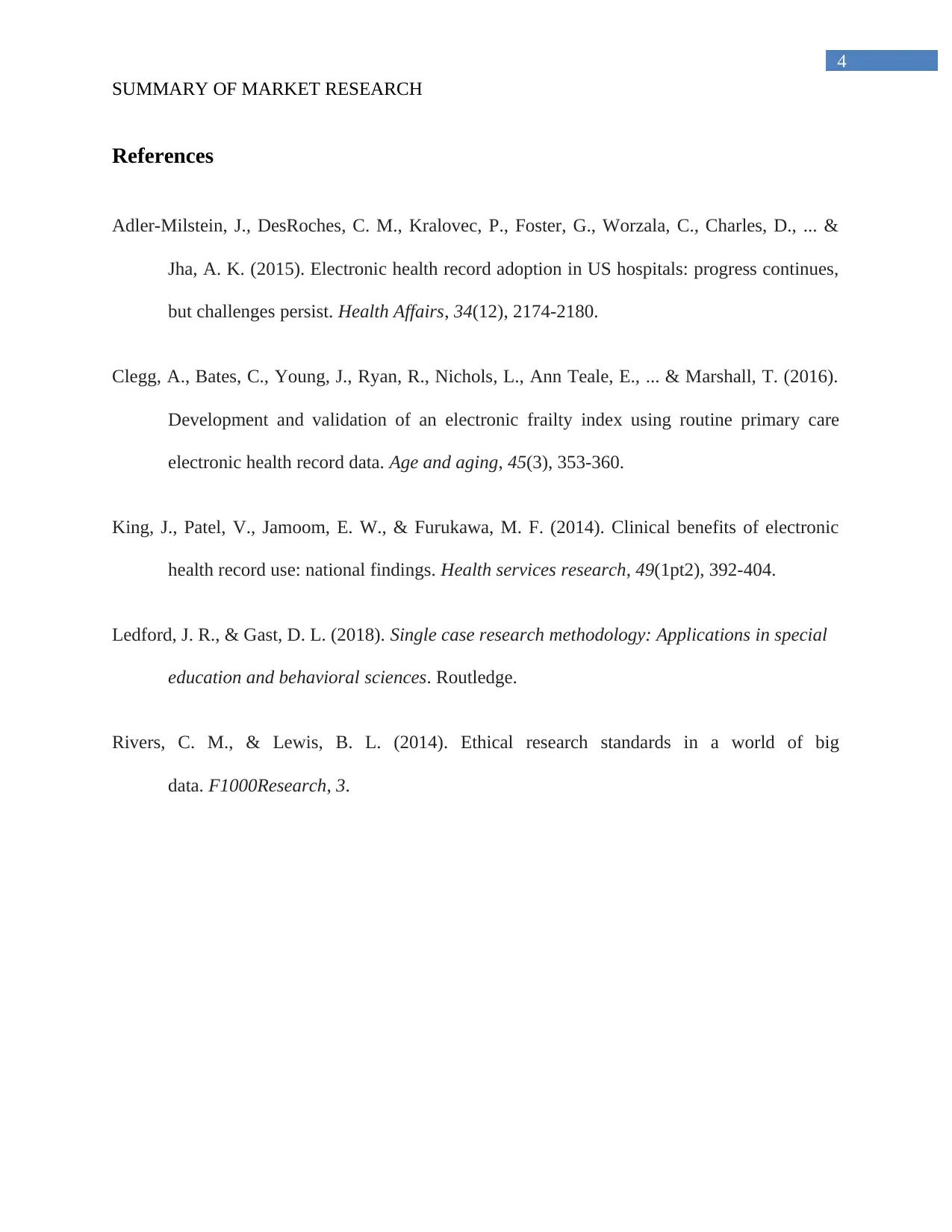
4
SUMMARY OF MARKET RESEARCH
References
Adler-Milstein, J., DesRoches, C. M., Kralovec, P., Foster, G., Worzala, C., Charles, D., ... &
Jha, A. K. (2015). Electronic health record adoption in US hospitals: progress continues,
but challenges persist. Health Affairs, 34(12), 2174-2180.
Clegg, A., Bates, C., Young, J., Ryan, R., Nichols, L., Ann Teale, E., ... & Marshall, T. (2016).
Development and validation of an electronic frailty index using routine primary care
electronic health record data. Age and aging, 45(3), 353-360.
King, J., Patel, V., Jamoom, E. W., & Furukawa, M. F. (2014). Clinical benefits of electronic
health record use: national findings. Health services research, 49(1pt2), 392-404.
Ledford, J. R., & Gast, D. L. (2018). Single case research methodology: Applications in special
education and behavioral sciences. Routledge.
Rivers, C. M., & Lewis, B. L. (2014). Ethical research standards in a world of big
data. F1000Research, 3.
SUMMARY OF MARKET RESEARCH
References
Adler-Milstein, J., DesRoches, C. M., Kralovec, P., Foster, G., Worzala, C., Charles, D., ... &
Jha, A. K. (2015). Electronic health record adoption in US hospitals: progress continues,
but challenges persist. Health Affairs, 34(12), 2174-2180.
Clegg, A., Bates, C., Young, J., Ryan, R., Nichols, L., Ann Teale, E., ... & Marshall, T. (2016).
Development and validation of an electronic frailty index using routine primary care
electronic health record data. Age and aging, 45(3), 353-360.
King, J., Patel, V., Jamoom, E. W., & Furukawa, M. F. (2014). Clinical benefits of electronic
health record use: national findings. Health services research, 49(1pt2), 392-404.
Ledford, J. R., & Gast, D. L. (2018). Single case research methodology: Applications in special
education and behavioral sciences. Routledge.
Rivers, C. M., & Lewis, B. L. (2014). Ethical research standards in a world of big
data. F1000Research, 3.
1 out of 5
Related Documents
Your All-in-One AI-Powered Toolkit for Academic Success.
+13062052269
info@desklib.com
Available 24*7 on WhatsApp / Email
![[object Object]](/_next/static/media/star-bottom.7253800d.svg)
Unlock your academic potential
Copyright © 2020–2025 A2Z Services. All Rights Reserved. Developed and managed by ZUCOL.





